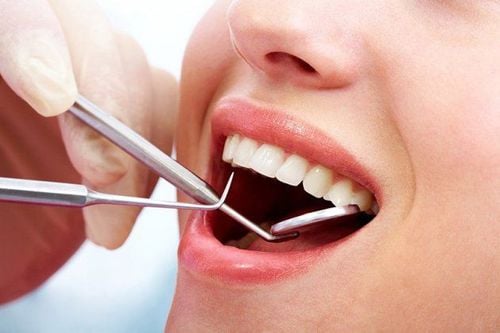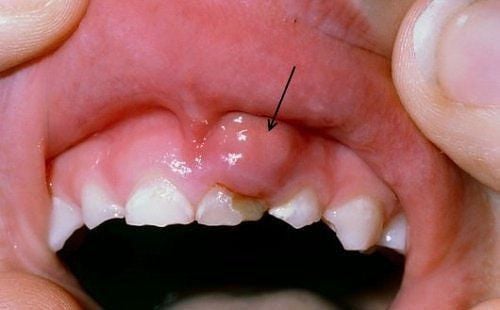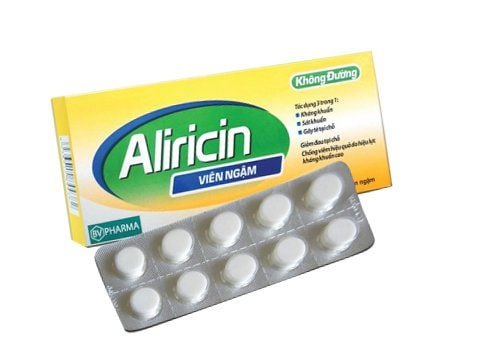This is an automatically translated article.
The article was written by MSc Lai Do Quyen - Doctor of Dentistry - Maxillofacial - Facial, Interspecialty Department - Vinmec Times City International HospitalOccasionally you may notice your gums bleed after brushing or flossing. Sometimes you will find that there is a natural flow of blood from the gums, clinging to the roots of the teeth. Bleeding gums or bleeding gums is one of the common oral diseases encountered every day. Although not a dangerous disease, if not treated in time, it will greatly affect your oral health.
1. What is bleeding gums?
Bleeding gums is a condition in which the gums around the roots of the teeth bleed and are a symptom of many different diseases. Bleeding gums is a warning sign of oral health or even your overall health.
2. Causes of bleeding gums
There are some serious causes of bleeding gums, but there are also causes that you don't need to worry too much about.
Causes of bleeding gums include:
Trắc nghiệm: Bận rộn có ảnh hưởng đến sức khỏe của bạn không?
Cuộc sống hiện đại khiến chúng ta vì quá bận rộn mà quên chăm sóc sức khỏe cho chính mình. Ai cũng biết rằng lịch trình làm việc cả ngày có thể khiến bạn kiệt sức, nhưng cụ thể bận rộn ảnh hưởng thế nào tới sức khỏe? Hãy cùng làm thử bài trắc nghiệm dưới đây.
2.1 Local causes
Gingivitis: is the most common local cause. Poor oral hygiene habits, not using dental floss, make the tooth surface not clean, food residue in the interdental spaces will stimulate the gums to cause bleeding. On the other hand, when the tooth surface is not clean, tartar is attached a lot and is not removed periodically, it will cause gingivitis and bleeding gums. The more inflamed the gums, the more bleeding gums. Diseases of the teeth: when the teeth are decayed, especially in the interdental spaces, food is deposited in the deep holes, causing gingivitis in the interdental spaces. The foci of infection at the roots of the teeth that cause swollen gums also cause bleeding gums. On the other hand, when a tooth is painful or sensitive, you tend to avoid chewing on the side of the painful tooth, which makes tartar easier to stick, causing gingivitis and bleeding gums. Diseases of the periodontal area: gingivitis left untreated for a long time will cause damage to the periodontal area or periodontal tissue (periodontitis). At that time, the gums will bleed more and last longer. It is a rather serious condition because if there is treatment, the area around the teeth will not be restored to the way it was before and leaves many serious consequences.
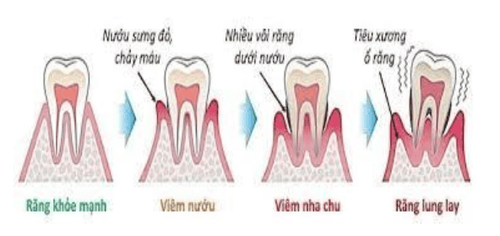
Crooked, crooked teeth: when teeth are crooked, crowded, it will make oral hygiene difficult, food is difficult to remove, making gums easy to inflammation and bleeding gums. Injury to gums: rubbing on teeth causes bumps on gums, brushing too hard, using a hard brush or using dental floss too hard, ... also causes bleeding gums.
2.2 Systemic causes
Unhealthy diet: eating a lot of hard food causes damage to the gums, lack of nutrients, especially vitamin C deficiency. Vitamin K deficiency: Vitamin K is one of the important factors in the blood clotting process of the body. body. When deficiency will cause bleeding anywhere in the body, which is beneficial. The main source of this vitamin in the body is produced by beneficial bacteria in the intestinal tract. Long-term use of antibiotics will reduce these beneficial bacteria, leading to a deficiency of autogenous Vitamin K and an increased risk of bleeding. Hormonal changes in women: Hormonal changes often occur during a woman's life stages such as puberty, pregnancy or menopause. These changes can also occur during oral contraceptive use. Hormonal changes increase the risk of bleeding gums and are now considered a common cause. Taking medication: this is a fairly common cause in people with chronic diseases who have to take medication regularly. Certain medications used for heart attack or stroke, anti-seizure medications, and cancer chemotherapy can also cause bleeding gums. Liver disease: The liver is a large organ of the body that performs many important functions, including blood clotting. Therefore, any kind of liver disease or alcoholism can affect the liver's metabolic function and eventually lead to many consequences, including bleeding gums.

Today, gingivitis has been considered as one of the complications of diabetes (infectious complications). Gingivitis makes diabetes difficult to control. On the other hand, diabetes makes gingivitis worse, the area around the teeth is damaged more quickly and eventually a mass of teeth is lost. Some diseases causing clotting disorders: hemophilia or hemophilia due to deficiency of clotting factors, hemorrhagic fever due to thrombocytopenia, Von Willebrand disease due to deficiency or decreased activity of clotting factors Von Willebrand in the blood... also makes gums easy to bleed and takes a long time to stop bleeding.
Certain cancers: leukemia, multiple myeloma can cause very heavy bleeding gums.
In addition to the above causes, there are other causes such as: smoking, trauma, stress, radiation therapy for cancer, HIV... can also lead to gum diseases and cause gum disease. bleeding gums.
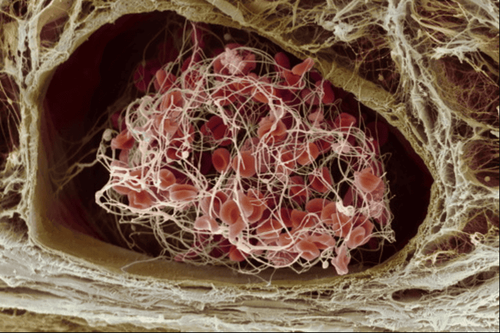
3. What to do when bleeding gums?
There are many folk remedies such as gargling with areca wine, drinking water from yellow comb leaves, etc. However, those ways do not rule out the cause of bleeding gums. When you see bleeding gums, you should:
Taking tartar is a must to do immediately to remove all tartar, plaque that causes gingivitis. Depending on the inflammation of the gums and the condition of the area around your teeth, the dentist will prescribe more drugs to treat gingivitis or have more complicated treatments. Immediately treat decayed teeth, infected teeth. You may be consulted to extract misaligned teeth or orthodontic treatment to correct crooked, crooked teeth. With the cause being a systemic disease, you should see a specialist immediately for advice and timely treatment.
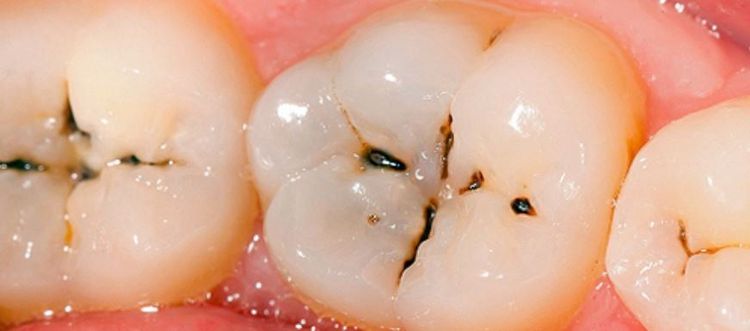
4. How to prevent bleeding gums
Very diverse. However, taking care of your teeth and taking care of yourself is very important. Things you can do every day are:
Maintain good oral hygiene by brushing properly, brushing gently with Fluoride toothpaste combined with flossing. You should choose a brush with soft bristles to brush your teeth and always remember to change the toothbrush as soon as the bristles start to get pressed down and spread out to the sides. The timing of each brushing session is also important. You should spend about 3-5 minutes for each brushing and should brush your teeth twice a day. Gargling regularly with mild salt water 3 times a day also helps keep gums healthy. The diet should be balanced, scientific, and full of nutrients. You should eat lots of green vegetables and fruits. Limit sweet, sticky and carbonated foods and drinks. Supplement with Vitamin C and minerals immediately if necessary. Limit or avoid smoking. Think positively, work and live in moderation, exercise regularly to avoid stress and psychological trauma. Do not arbitrarily use antibiotics without a doctor's prescription and minimize the use of antibiotics. You should ask your doctor about the side effects of medications you must take for your systemic illness and how to avoid them. You should also inform your dentist about the medical condition you are being treated for and the medications you are taking so that the dentist can prescribe the right treatment. You should get tartar at least once during your pregnancy. You should take the initiative to make an appointment to see and take tartar every 3-6 months. Once you detect bleeding gums, you should not ignore it, but need to see a doctor for treatment immediately and you should follow the professional treatment regimen.
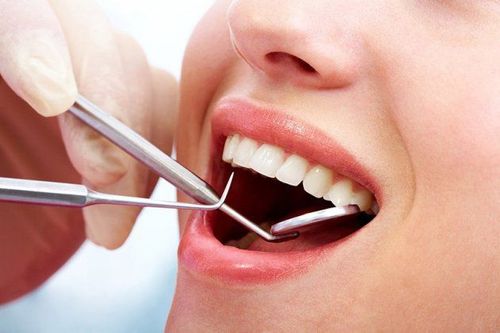
Vinmec International General Hospital is one of the hospitals that not only ensures professional quality with a team of leading medical doctors, modern equipment and technology, but also stands out for its examination and consultation services. comprehensive and professional medical consultation and treatment; civilized, polite, safe and sterile medical examination and treatment space.
Customers can directly go to Vinmec Health system nationwide to visit or contact the hotline here for support.





